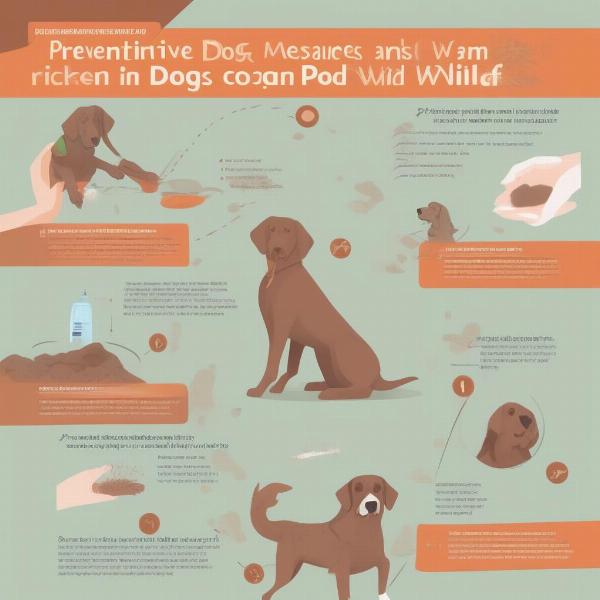Finding the right dog dewormer in Canada can feel overwhelming with so many options available. This guide provides essential information on dog deworming, helping you understand the different types of intestinal worms, choosing the best dewormer for your furry friend, and ensuring their long-term health and happiness.
Understanding the Need for Dog Dewormers in Canada
Intestinal worms are a common problem for dogs in Canada, regardless of age or breed. These parasites can cause a range of health issues, from mild discomfort to severe illness. Regular deworming is crucial for preventing infestations and protecting your dog’s overall well-being. Understanding the different types of worms, their life cycles, and how they are transmitted is essential for responsible pet ownership.
Common Types of Intestinal Worms in Canadian Dogs
Several types of intestinal worms commonly affect dogs in Canada:
- Roundworms: These are the most common intestinal parasites in dogs. They can be transmitted through contaminated soil, feces, or even from mother to puppy through the placenta or milk.
- Hookworms: These worms attach to the intestinal wall and feed on blood, potentially causing anemia. They can be found in contaminated soil and can penetrate the skin.
- Whipworms: These worms live in the large intestine and can cause diarrhea, weight loss, and even bloody stool. They are transmitted through ingestion of infected feces.
- Tapeworms: These segmented worms are transmitted through fleas. If your dog ingests an infected flea, it can develop a tapeworm infestation.
Choosing the Right Dog Dewormer in Canada
Selecting the appropriate dewormer depends on several factors, including your dog’s age, weight, and the specific type of worm being targeted. Always consult with a veterinarian to determine the best course of action for your dog. They can perform fecal tests to identify the specific type of worm present and recommend the most effective dewormer. Never administer a dewormer without first consulting your vet.
Deworming Puppies and Adult Dogs in Canada
Puppies are particularly vulnerable to intestinal worms and require a more frequent deworming schedule. Typically, puppies are dewormed every two to three weeks starting at two weeks of age, continuing until they are several months old. Adult dogs typically require deworming every three to six months, depending on their lifestyle and risk factors.
Prevention and Hygiene Practices
 Preventative Measures for Dog Worms in Canada
Preventative Measures for Dog Worms in Canada
In addition to regular deworming, maintaining good hygiene practices is crucial for preventing worm infestations:
- Pick up dog feces regularly: This helps prevent the spread of worm eggs in the environment.
- Wash your hands thoroughly after handling your dog or their feces.
- Prevent your dog from consuming wildlife or scavenging.
- Control fleas on your dog and in your home.
Signs of Worm Infestation in Dogs
Recognizing the signs of a worm infestation is important for early intervention. Some common symptoms include:
- Vomiting
- Diarrhea
- Weight loss
- Pot-bellied appearance (especially in puppies)
- Scooting or dragging their bottom along the ground
- Dull coat
- Lethargy
If you notice any of these signs, consult your veterinarian immediately.
Conclusion
Protecting your dog from intestinal worms is a crucial aspect of responsible pet ownership in Canada. By understanding the different types of worms, choosing the right dewormer, and following preventative measures, you can ensure your furry friend stays healthy and happy. Remember to consult with your veterinarian for personalized advice and to establish a regular deworming schedule tailored to your dog’s specific needs. Don’t hesitate to reach out to your vet if you have any concerns about your dog’s health.
FAQ
- How often should I deworm my dog in Canada? The frequency of deworming depends on your dog’s age, lifestyle, and risk factors. Consult your veterinarian for personalized recommendations.
- Can I buy dog dewormers over the counter in Canada? Yes, some dewormers are available over the counter, but it’s always best to consult your vet before administering any medication.
- Are all dog dewormers the same? No, different dewormers target different types of worms. Your vet can help you choose the right one.
- What are the signs of worms in dogs? Signs can include vomiting, diarrhea, weight loss, a pot-bellied appearance, scooting, and a dull coat.
- Can humans get worms from dogs? Yes, some types of worms can be transmitted from dogs to humans. Practice good hygiene to minimize the risk.
- How can I prevent my dog from getting worms? Regular deworming, picking up feces, and preventing your dog from consuming wildlife can help prevent worm infestations.
- What should I do if I think my dog has worms? Consult your veterinarian immediately for diagnosis and treatment.
ILM Dog is your trusted resource for expert dog care advice and information. We cover a range of topics, from breed selection and health care to training, nutrition, grooming, and product recommendations. If you have any questions or need further assistance, please don’t hesitate to contact us. Email: [email protected] Phone: +44 20-3965-8624. For more helpful information about dog care, visit ILM Dog.